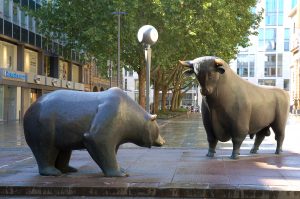2019-5-23 14:15 |
Almost anyone can develop the skills needed to become a professional trader, yet there’s certainly more to it than just a sharp suit and a talent for numbers. People enter the profession via many different routes and social backgrounds, drawing on a wide array of transferable skills when it comes to carving out their own path to success.
The lucrative nature of the industry is attracting more and more ambitious professionals than ever before, including those with very little past trading experience. A good indication of this is the rise in popularity of the forex market in recent years, largely driven by advances in technology and widespread availability of information. The latest stats from Finance Magnates show that 43.5% of forex traders are millennials aged between 25-34 years old, which underlines the ambition and zeal that many younger people now have to find success within the industry.
In many ways, that’s the beauty of the modern trading profession. Technical know-how can be taught over the course of months and years, but it’s generally much more difficult to teach the mentality, psychology and natural drive required to become a successful trader. And whilst certain skills may fit better with certain styles of trading, there are a few fundamental abilities that are easily transferable across the industry as a whole.
Let’s take a look at a few aspects of the trading mentality that many people may already have in their locker, even if they have zero trading experience to call on.
The mentalityStock Market Analysis can be thirsty work – “Analyzing Stock Market” (CC BY-SA 2.0) by ota_photos
The ability to maintain composure is an essential trait that all successful traders share. Once a clear strategy is in place, it takes somebody who is calm, composed and able to control their emotions order to execute the plan with minimal distraction or risk of making knee-jerk decisions. This is most certainly the case when managing risk through stop losses or delivering profit at set points.
In fact, many strategies are designed with short-term setbacks in mind, so it takes a high level of composure to get through a bad run and remain focused on long-term goals. Issues almost always start to crop up whenever a trader allows emotion to creep in and affect their judgement, especially when things aren’t going quite to plan. In these circumstances, it’s easy for the initial strategy to go straight out the window.
Alongside composure, traders need to draw on a certain degree of analytical skill and thirst for information when conducting their research. Focus and concentration allow professionals to digest masses of financial information and filter out the significant data points that they will then look to act upon. Whether it’s spotting trends in orange juice stocks or cryptocurrency value, many traders make the conscious decision to concentrate on specific securities and invest their time in gaining maximum knowledge of a particular sector, rather than spreading themselves too thin.
Either way, staying on top of every available shred of relevant information is no mean feat, but it’s often the difference between staying ahead of the curve and lagging behind the rest of the market. Most successful traders are also relatively obsessive about keeping records of significant trades and market activity, giving them a strong foundation to test, tweak and improve their approach at each stage of a campaign.
Transferring your talentNumbers are handy in many fields, not just in finance – “Numbers And Finance” (CC BY-SA 2.0) by kenteegardin
Of course, each of these traits can be developed and exercised outside of the trading context, which means that anybody looking to get into the industry may already possess the core potential and skillset needed to become a successful trader. If you’re already accustomed to a fast-paced working environment where making quick, well-informed decisions is absolutely vital to success, that experience would likely translate well. It’s also no secret that the world of trading can produce a highly pressurised environment for those on the front line, so the ability to respond well, stay concentrated and thrive under pressure is key.
Of course, it works the other way too. For any trader looking to switch industries and try their hand at a different line of work or new hobby, the experience and skills gained through trading often prove hugely valuable across countless pastimes and professions. Processing and dissecting large quantities of information at speed is certainly an asset, as is client communication, strategy creation and ability to solve problems under pressure.
Let’s take a look at three potential areas of interest in which the trading skillset can be a distinct advantage: construction, poker and marketing.
ConstructionAs with trading, the ability to stick to long-term goals in the face of short-term setbacks is essential in the construction industry, especially when managing high-value projects. Being able to process new information at each stage of a project and then quickly draw on that knowledge to make informed decisions is also a crucial asset. There’s also the need to get a tight grip on purchasing and materials management, as well as the financial side of laying out accurate costs for long-term projects ahead of time.
PokerThe focus, concentration and composure involved with high stakes trading is almost identical to the skillset needed to become a successful poker player. Whether you’re playing Texas Hold’em, Five Card Stud or Omaha Hi-Lo, the ability to stick to an informed poker strategy in the face of constant adversity and changing conditions is crucial to coming out on top. A solid understanding of variance and mathematical possibility is also a massive advantage for both traders and poker players alike. Having faith in your knowledge of variance is essential to make it through bad runs without being tempted to act on impulse and emotion.
MarketingThe world of marketing isn’t just about creating catchy buzz-phrases or throwing company events; it demands a high standard of interpersonal skills, client communication, creative talent and aptitude for customer service. Another transferable talent between marketing and trading is the ability to develop extensive knowledge of one particular product or service – the main commodity that you are tasked with promoting. Like traders, marketers naturally become experts in their particular field of interest and are always prepared to deepen their understanding whenever an opportunity or new source of information presents itself.
Looking to make the most of your skillset?
The rise of trading popularity is a symptom of this digital age – “The Best Age to Trade (USE FOR YOUR BLOG” (CC BY-SA 2.0) by mytradingskills
If you’re in the hunt for a fresh challenge then it’s good to remember there has never been a better time to dip your toes into many pools. The digital age has made it easier than ever to spot opportunities, source essential information on specialist subjects and get up to speed on what exactly is required to make your new venture a success.
In most cases, being able to draw on transferable skills such as analytical ability, composure under pressure and client communication is far more important than already having practical experience on the trading floor. There is no end to the number of potential avenues and professions through which people enter and leave the trading industry. Ultimately, that’s what makes the trading industry so unique and rewarding for anybody willing to invest their time, energy and concentration in this line of work.
The post The Trading Skillset – Is Your Talent Transferable? appeared first on ZyCrypto.
origin »Bitcoin price in Telegram @btc_price_every_hour
Bit Public Talent Network (BPTN) íà Currencies.ru
|
|


